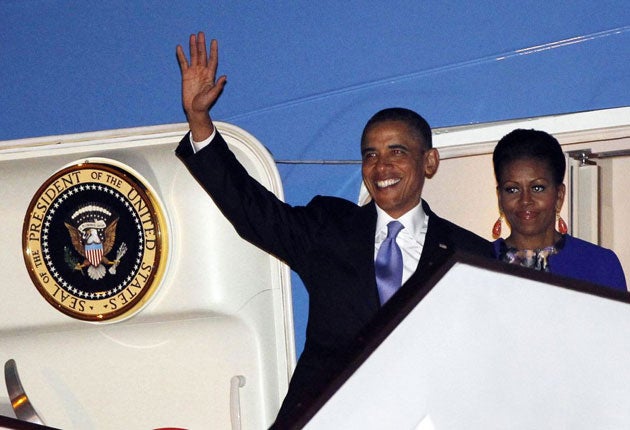Obama and Cameron begin visit with warning shot at Arab autocrats
US President arrives in London early due to Icelanic volcano / Stalemate in Libya to top agenda at Downing Street meeting

Barack Obama and David Cameron will today vow to lead a crusade for democracy in the Arab world – if necessary, by using military might to protect people from autocratic regimes.
In a strongly worded joint statement last night, the two leaders declared: "We will not stand by as their aspirations get crushed in a hail of bombs, bullets and mortar fire. We are reluctant to use force, but when our interests and values come together, we know we have a responsibility to act."
They added: "We will stand with those who want to bring light into dark, support those who seek freedom in place of repression, aid those laying the building blocks of democracy."
Mr Obama arrived at Stansted airport last night for a state visit after his flight from Ireland, originally scheduled for today, was brought forward over fears that it could be delayed by the ash cloud from a volcano in Iceland. He and his wife, Michelle, stayed at the US Ambassador's residence in London last night and will spend the next two nights at Buckingham Palace.
Britain is to send ground-attack helicopters to Libya in an escalation of Nato's military operation against Muammar Gaddafi's regime. The Apache helicopters, used in Afghanistan, will fly from from HMS Ocean, allowing smaller targets in built-up areas to be hit. France is deploying 12 combat helicopters. Until now, fighter jets have aimed guided bombs from an altitude of at least 15,000ft.
The stalemate in Libya is expected to top the agenda when Mr Obama and Mr Cameron hold formal talks in Downing Street tomorrow. In public, they are likely to play down any private demands by Mr Cameron for the US to play a greater role after it scaled down its initial involvement in the air campaign.
Speaking after talks with the Foreign Secretary William Hague in London last night, the US Secretary of State Hillary Clinton called on other Nato countries to do more in Libya. "Even today, the US continues to fly 25 per cent of all sorties, we continue to provide the majority of intelligence, surveillance and reconnaissance assets," she said.
Mr Obama and Mr Cameron will also discuss Pakistan and Afghanistan following the killing of Osama bin Laden, the Middle East peace process and the global economy. Mr Cameron will be looking to Mr Obama for support in the British Government's tough deficit-reduction strategy.
The two leaders, anxious to see an end to military operations in Afghanistan, have been cautious about intervening militarily. So their willingness to consider action in North Africa and the Middle East is highly significant. Their call for democracy and human rights will be seen as a warning shot aimed at Saudi Arabia, after Mr Obama was accused of not being tough enough on his country's long-standing ally.
In a joint article in today's edition of The Times, the two leaders recalled that President Ronald Reagan and Baroness Margaret Thatcher acted as a "vital catalyst for change" during the turbulence of the 1980s, which ended with the fall of the Berlin Wall.
Mr Obama and Mr Cameron redefined the much-vaunted "special relationship" between the US and Britain as an "essential relationship". They said: "It is founded on a deep emotional connection, by sentiment and ties of people and culture. But the reason it thrives, the reason why this is such a natural partnership, is because it advances our common interests and shared values.
"It is a perfect alignment of what we both need and what we both believe. And the reason it remains strong is because it delivers time and again. Ours is not just a special relationship, it is an essential relationship – for us and for the world."
Mr Cameron's pursuit of a "solid not slavish" relationship with the US coincided with Mr Obama's wish to build new links to the world's emerging economies rather than Britain and Europe. But now the two leaders have been pushed closer together by the unexpected "Arab spring".
According to an ITV/ComRes poll, 60 per cent of the British public say Mr Obama is proving to be a good President and 70 per cent think that he is doing a better job than George W Bush. Only 29 per cent indicated that Mr Obama has not lived up to the expectations they had when he was first elected, while 46 per cent said that he has.
Subscribe to Independent Premium to bookmark this article
Want to bookmark your favourite articles and stories to read or reference later? Start your Independent Premium subscription today.

Join our commenting forum
Join thought-provoking conversations, follow other Independent readers and see their replies